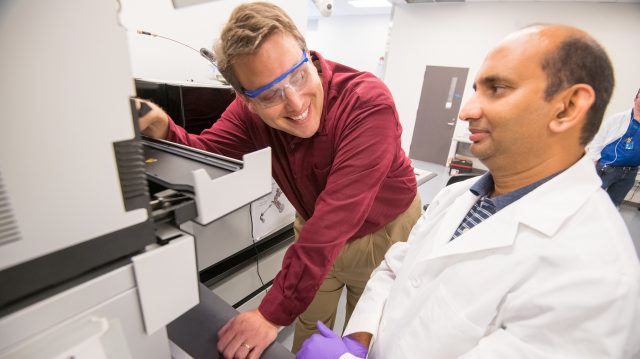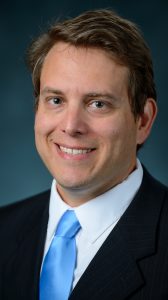
UM pharmacology professor Joshua Sharp (left) works with associate research scientist Sandeep Misra in a lab in the Department of BioMolecular Sciences. Photo by Kevin Bain/Ole Miss Digital Imaging Services
OXFORD, Miss. – The University of Mississippi has received a $10.5 million Centers of Biomedical Research Excellence Phase I grant from the National Institutes of Health to establish a new center dedicated to glycoscience, funded for the first year at $2,107,042.
The Glycoscience Center of Research Excellence, known as GlyCORE, will study how carbohydrates and carbohydrate-containing molecules affect human health.
Joshua Sharp, associate professor of pharmacology, chemistry and biochemistry, is project leader on the award. Samir Ross, professor of pharmacognosy, will serve as co-principal investigator with Sharp.
The center will be a boon to researchers, even those who aren’t focused on glycoscience, Sharp said.
“GlyCORE seeks not only to support the research of dedicated glycoscientists, but to support researchers in all disciplines as their particular research questions touch upon glycoscience by lowering the barriers to entry,” he said.
By directly funding select research projects, establishing mentors for early career investigators, aiding in the recruitment of new faculty in glycoscience, and bringing together investigators for local and regional meetings, GlyCORE will help researchers at the university and throughout the Mid-South region.
“We’re very excited to see the launch of this initiative,” said David D. Allen, dean of the School of Pharmacy. “We are grateful for both Josh and Samir’s leadership in this field and appreciate their dedication in securing this grant. We look forward to seeing the impact of the center and its research for years to come.”
Researchers are not the only ones who will benefit from the center. Sharp noted that GlyCORE is supporting a number of projects that could have a positive impact on public health. The center will have affiliated researchers working on heart disease, antiviral strategies, antibiotics, diabetes, HIV and more.
GlyCORE’s research also will help medical professionals in meeting one of the top health challenges of today: COVID-19. The center is supporting researchers at the University of Mississippi Medical Center in their development of COVID-19 diagnostics.
Sharp predicts a bright future for GlyCORE, noting that the public will reap rewards of the center’s efforts.
“Since glycoscience touches on all aspects of biology, the potential health impacts of GlyCORE are limited only by the talent and creativity of our faculty,” Sharp said.
While GlyCORE will be housed within the School of Pharmacy, faculty from across the university are welcome to contribute. Besides faculty from the Department of BioMolecular Sciences and the Department of Pharmaceutics and Drug Delivery, the center has participants from the chemistry and biochemistry and biology departments, along with the School of Engineering.
Sharp said he hopes to see participation grow even more.
“We look forward to expanding our reach as researchers across campus become familiar with our center and the resources we have to offer for the field of glycoscience,” he said.
